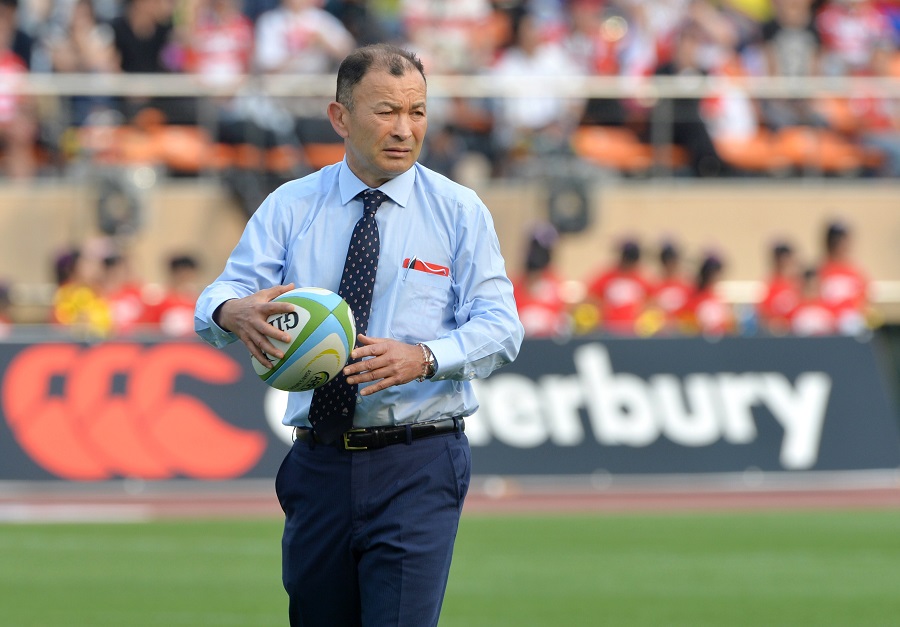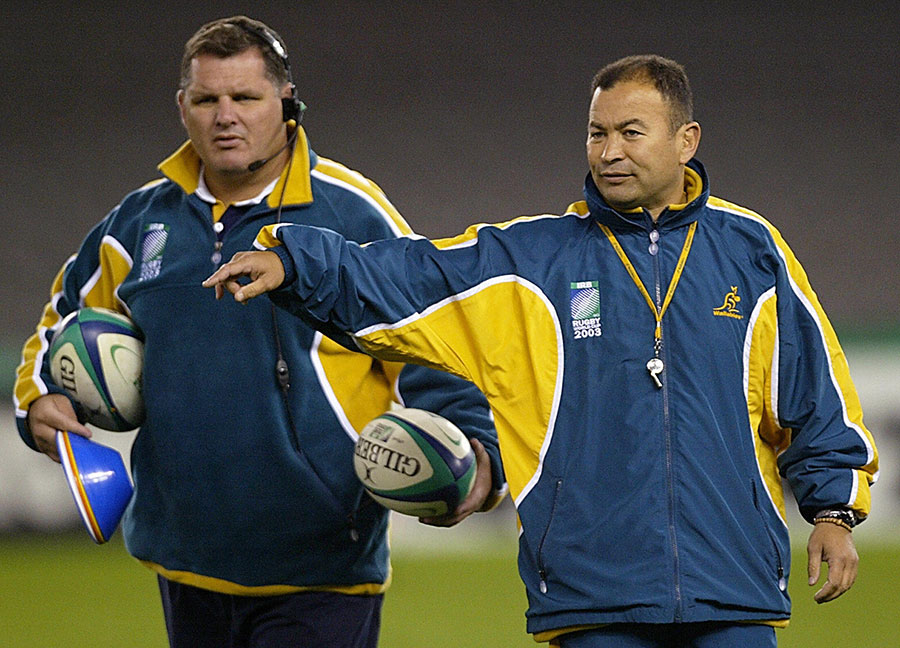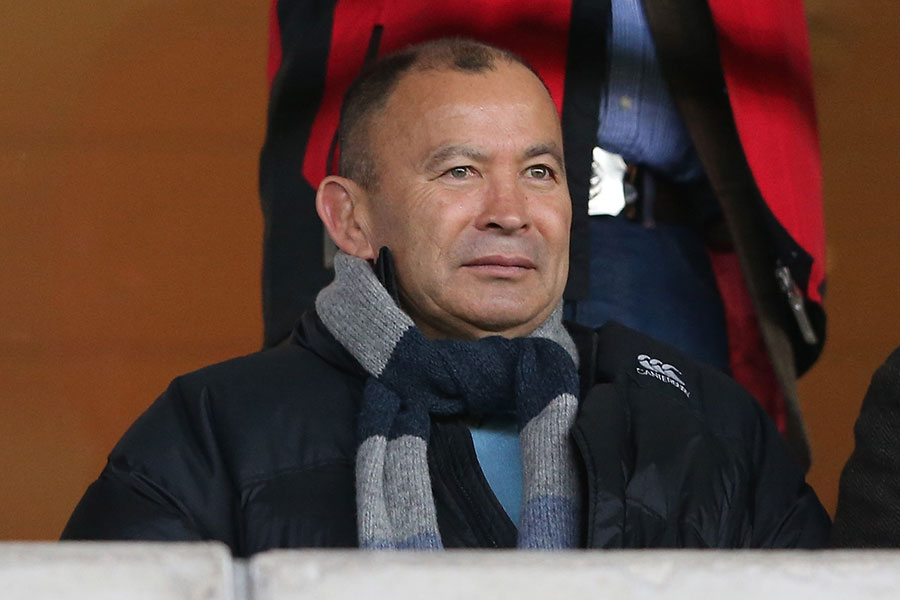|
Six Nations
Eddie Jones - Behind the iron mask of England's coach
Greg Growden
February 3, 2016
O'Shea: Jones will excite players and the media
Early inspiration You all know Eddie Jones' overwhelming rugby prowess, but he is as obsessive about another sport -- cricket. He loves the game. When he said a few months ago that he was getting too old for this rugby coaching caper and "at my age I should be in Barbados watching cricket", he wasn't exactly kidding. He maintains a deep interest in the summer passion, which included playing several seasons as an early order batsman with the Randwick club in Sydney some decades ago. And if you know Eddie Jones, you also wouldn't be surprised to discover his sporting idol is one of Australian cricket's most combative figures -- Ian Chappell.
Some years ago, I edited a book entitled 'My Sporting Hero', which involved numerous Australian identities nominating and sharing their stories of sportspeople they admired. It ranged from the Australian Governor General Peter Cosgrove writing about John Eales, the Wallabies' 1999 World Cup-winning captain; Australia's best known playwright David Williamson's admiration of Olympic runner John Landy; and David Campese being inspired by the likes of Doug Walters, Graeme Langlands, Ivan Lendl, Mark Ella, Michael Jordan and writer Nancye Sims, whose poem Winners Take Chances he would read before every game he played. Even though Jones at the time was busy coaching the Wallabies he relished the chance to write about a man who showed him the best, the only way to approach any contest: full on.
As an 11-year-old, in February 1971, Eddie sat with his father at the Sydney Cricket Ground watching Chappell, who had just taken over from Bill Lawry, in his first Test as captain against Ray Illingworth's formidable England team. Eddie was enthused by Chappell's "defiance, restlessness and unconventionality" -- all traits the avid spectator later picked up and ran with. The culture of the team was crucial. Playing for the team was imperative. "Ian Chappell certainly influenced my thinking on sport," Jones wrote. "I have been lucky enough to coach a number of teams. I want the teams that I coach to be tough and uncompromising. I want them to play positive rugby. I want our team to play entertaining rugby that sets standards of play. And I want to make sure that our team and team-members are selfless in pursuit of excellence. These attributes are the attributes of Ian Chappell." The 'Beaver' in the front-row The eldest of the Chappell clan never stood for too much nonsense. Neither does Jones. As a player, he performed well above his weight. He was never quite big enough, broad enough to make it as a Test hooker, but that didn't stop him from trying. Between 1987-89, he was the New South Wales rake, and a shortage of bulk was made up for with aggression, plenty of lip, a good skill set and a refusal to let anyone intimidate him. If there was a set-to, he was always pretty close to the heart of it. You would always hear him. That guttural, rasping, grinding, fingernails-across-the-chalkboard voice, winding up opponents. He had the perfect nickname during his playing days. Beaver. Forever burrowing away at the bottom of scrums and breakdowns. Getting in everyone's way. He was the most committed of competitors.
Brought up into the tougher areas of Sydney's Eastern Suburbs, educated at Matraville High with Australian internationals Glen, Gary and Mark Ella and taught all the tricks at the hard, no frills and often unforgiving Randwick Rugby Club. He was never frightened of anyone, especially those with a fancy reputation. He would get in their face, and see if they would flinch. And to be part of the Galloping Greens senior team you had to be street-wise. For decades, they thrived on mean, keen performers. It was the ultimate rugby university. In that Randwick pack were three future Wallabies coaches -- Jones, Michael Cheika and Ewen McKenzie. There they were taught to stand their ground. Jones reveled in that environment.
You could imagine if he was an immaculate cricketer, his fielding spot would have been at short leg during a Test match, grinding away at the batsman, eventually becoming a distraction. He would have fitted in well with any Chappell-led cricket team. The team, and doing all he can to give it an edge, has always been Jones's prime motivator as a player and now coach. He appreciates the mental side. During the recent Rugby World Cup, Jones described his old teammate and now opposing coach Cheika as "a decent player, but an outstanding sledger". As opponents of Jones during his playing days would vouch, it takes one to know one. He was also pretty handy in the sledging department. The Japanese transformation If you want to see the Eddie Jones who has struck fear into players, journalists, officials, opponents and the like, watch this video: Japan had been belted 40-21 by a fair to middling French Barbarians team in 2012. It is vintage Beaver. Sitting next to him was Japan captain Toshiaki Hirose. The skipper is looking a bit uneasy. He keeps his eyes down. He clearly knows what is about to happen.

Eddie Jones made huge improvements to the level of Japanese rugby © Getty Images
Enlarge
Jones is furious. The one-time school principal sits with arms crossed. In short, sharp sentences, punctuated by a very calm interpreter translating his English venom into Japanese venom for the local media, he is relentless. Staccato sledging. Sometimes he appears to be struggling to keep control of his emotions. He complains that his team "showed no fight", "let the French Barbarians do what they wanted to do" and "so I will need to have a real rethink about selection". He warns some of the team wouldn't ever play for Japan again.
"I yelled and screamed at half-time like a schoolteacher, and in the second half we don't have a go... Why? The players don't want to win enough. They don't want to change enough. So I will have to change the players. I'm sick of it. "We've either got to find Japanese players who want to do that, or we might have to go back to the old selection policy -- and pick 10 foreigners. "That was terrible. A really bad indictment on Japanese Rugby. I apologise for the performance. I'm responsible for it. The coaching is not up to the standard it should be, but I can guarantee you I am going to change things." The captain appears to be scared to look to his left in case the coach gives him a backhander. He's asked for his opinion. With an embarrassed laugh, he attempts to start a response, but Jones, infuriated his captain may have been thinking that this was merely theatrics in front of the media, interrupts him.
"It's not funny. It's not funny. That's the problem with Japanese Rugby. Seriously. They're not serious about winning. If they want to win, they have got to go out and physically smash people. We didn't do it. I think I should probably leave." With it, a rueful shake of his head, still in disbelief that his captain should have uttered a momentary chuckle. Later it's back to Jones, and away he goes again: "We've got to grow up. It's got to happen quickly, because we've only got three years until the World Cup." Fast forward to that very World Cup, three years on, as Japan defeat South Africa. For so many, that most unexpected of triumphs is the highlight of the 2015 World Cup. It ranks among the greatest of World Cup moments. In the Japan team that day were just three survivors from the loss to the French Barbarians. A demanding boss and colleague Eddie Jones can be difficult to work with. He is so fastidious, so demanding, so clinical, so deeply focused, so work orientated, he can incinerate those around him, especially if they are a bit sensitive. If you don't stand up to him, he can crush you. Once on a flight, I sighted one of his assistant Australian Test coaches reading a self-help book. The chapter he had his head in was about self-confidence. Why? "So I can stand up to Eddie better." Roger Gould, a free spirit, didn't last too long as one of Eddie's assistants, while Andrew Blades conceded that working for his mother-in-law was an easier proposition than being Eddie's assistant.

Eddie Jones took the Wallabies to the 2003 Rugby World Cup final © Getty Images
Enlarge
He also can be unforgiving on those he doesn't think are putting in enough. He works on the fear factor. He pushes the contenders to the limits to see if they have the faculties to perform at the top level. As Wallabies prop Ben Darwin recently wrote in the Daily Mail: "Eddie Jones is not my favourite person in the world. Four years as a player being harangued, taunted and dragged kicking and screaming into a professional career means his name does not fill me with an enormous amount of joy. But I would not have played for Australia if it were not for him."
And anyone who was at Suncorp Stadium that night when Jones, then in charge of the Queensland Reds, sought out Quade Cooper in the dressing room after a hideous loss and harangued him for several minutes, will not forget that outburst for some time. It wasn't pretty. Again, vintage Beaver. But this highly organised man is also very protective of his players. If they are committed to the cause, he will defend them to the hilt. Difficulties with the Wallabies There are vast differences in how Jones took over as head coach for Australia, compared to his appointment with England. In 2001 when Jones replaced Rod Macqueen, he was the first in recent decades whose predecessor had gladly handed him the reins. There was a downside to this. He was given a golden team that had little else to achieve. This was at a time when Australia won big trophies -- even World Cups and Bledisloe Cups. When appointed to the position, he said: "There's no more trophies left to win. You go up to the Australian Rugby Union offices and everything that's silver in world rugby is right up there. So the aspiration cannot be to win more trophies. The aspiration must be, how can we play better?"
He then said he wanted his squad to be as ruthless as the Australian cricket team at a time when they were "crushing oppositions". That didn't quite happen. The Wallabies instead suffered their own crushing moments. While his technical understanding is second to none, as is his encyclopedic knowledge of the game, his attention to detail did not win over everyone. He had difficulties with head office, with the Australian Rugby Union becoming concerned with his people skills, and that he was an overly demanding task master. As the then ARU chief executive John O'Neill said: "He [Jones] was immersed in minutiae rather than taking a big picture approach."
His fullback Matthew Burke explained that in the 1990s "we [the Wallabies] had two set moves we used ... now we walk out of team meetings with pages and pages of moves and tactics and analysis". Jones also could not get the team to be consistent. In the end, his win rate with Australia was 57 percent. But some years later, Jones showed exactly what he could achieve. His role in the Springboks winning the 2007 World Cup should not be underestimated. Jake White was the head coach, but Jones, as his technical adviser, was heavily involved in all aspects of their preparation. It was no surprise that the Stormers were keen to get him back to South Africa this year to take over their Super Rugby campaign, and indeed had him for all of eight days, until England snaffled him up. These days there are no doubts he has mellowed. He has been forced to calm down, due to health issues. In 2013, he was hospitalised after showing signs of a minor stroke. It just made watching cricket in the Caribbean that much more appealing. He now appears to be more big picture. England's 'hardened' new era Jones will shake up England Rugby. Due to his relentless, front-foot approach, he will upset some, and it appears he already has. That won't bother him. He actually doesn't mind if there is a bit of edge. He will attempt to cut through the politics to get his own way. That has already caused a stir in the ranks, with some clubs wary of the way he conducts his business to ensure he gets the best support staff available. There's no doubt that under Jones, England will be a far more resilient and hardened team. And the general public will know exactly what he is up to. He will be open to the media. He understands how the media operates. He enjoys the writing process, producing punchy, perceptive articles for numerous newspapers over the years, has a deep interest in how the media works, and comprehends that it is a vital cog in the game.

Eddie Jones took in a swathe of Premiership matches before settling on his Six Nations squad © Getty Images
Enlarge
His relationship with the press has been prickly at times, but there is always respect. He appreciates those rugby writers who do their homework, have ideas, or are willing to back themselves. He backs the worker. He has little appreciation for the lazy scribe chasing an easy storyline. He always knows what is being written about his team, or about him. He constantly does his research, and is clever enough to know that by keeping a close relationship with the media he can always get his say. He enjoys the tussle. Also in his favour is that he is an excellent selector. And as anyone who has observed England Rugby for some time will know, poor selections and silly choices have been at the core of their problems. The player base is there, but their selectors have too often been star-struck, expecting too much too early from those who are clearly not yet up to it. Sam Burgess, a convert from Rugby League who found himself starting England's pivotal Rugby World Cup match against Wales 10 months later, was the ultimate case. It could easily end in tears, but if Jones gets his way, there's no doubt that England will be a far more resilient outfit. They won't flounder, or appear clueless, as they did during the World Cup. He will give them a purpose. He will treat them mean, keep them keen, and that should provide the team with a much-needed hardened edge. That's why he was saying a month out from the Six Nations that he wants England to be 'the most dominant team in the world". "It puts no pressure on me; the pressure's on the player. Players who haven't been selected haven't done well enough, it's as simple as that. So all the pressure is on the players." When he announced his first England squad, missing were numerous World Cup flops, plus several notable names. He is not interested in those who are scarred, only those who strive for success. Right from the start, everyone knows he will not compromise. He won't be a nice guy -- and it will be interesting to see how the Twickenham stiffs handle that. As he wrote about Ian Chappell: "He stood at first slip, shirt unbuttoned, gesticulating and encouraging the down-beaten Australian team to follow his lead. He didn't look comfortable leading a team that seemed to be accepting defeat. Performance was everything -- and he would strive to find any way possible to get his team to perform at their best. Convention would not stand in his way." Ditto Jones and England. © ESPN Sports Media Ltd
|
Live Sports
Communication error please reload the page.
-
Football
-
Cricket
-
Rugby
-
- Days
- Hrs
- Mins
- Secs
F1 - Abu Dhabi GP
Abu Dhabi Grand Prix December 11-131. Max Verstappen ()
2. Valtteri Bottas (Mercedes)
3. Lewis Hamilton (Mercedes)
4. Alexander Albon ()
5. Lando Norris ()
6. Carlos Sainz Jr ()
-
ESPNOtherLive >>
Boxing - Nelson v Wilson; Simmons v Dickinson; Joshua v Gavern (Metro Radio Arena, Newcastle)
Golf - Houston Open
Snooker - China Open
Tennis - Miami Open

